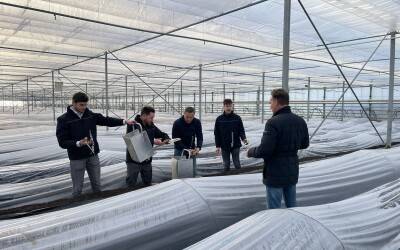WILL TEEUWEN (TEBOZA): 'CASH CROP SEASON OFF TO A GOOD START, BUT CONTINUATION OF GREENHOUSE GROWING DUE TO EXTREMELY WET AUTUMN STILL UNCERTAIN'
On Tuesday 23 January, Teboza's sales team harvested the first Dutch asparagus from the greenhouse. "Despite the fact that as Teboza is involved with asparagus all year round, this moment is always very special for us. These are still very small quantities, but from Thursday 25 January onwards, the harvest is already growing and then we expect to enter the season with an upward trend. For the cash asparagus, the prospects look very good. It seems we have the cold behind us and we now have fairly mild weather, so that's not going to hamper growth," says Will Teeuwen. The first asparagus are traditionally reserved for sales towards food service, catering and greengrocers. We will start supplying retail around week 11.
Asparagus with its feet in the water
However, the continuation of greenhouse cultivation is still uncertain. "Normally at this time of year, we have the beds long and wide ready and the foils are on them, but now there is virtually nothing ready nationwide for the 2024 harvest season due to the wet autumn. We had two months of rain and could not even get into the fields on foot. That preparatory work will have to start next week anyway, otherwise the heated crop will also be at risk. Firing the asparagus has to start in late January, early February, otherwise the asparagus will come too late," Will said. "All these weather extremes do worry me. Due to the wet weather, the asparagus have been on their feet for two months. Whether that will negatively affect the number of kilos harvested per hectare remains to be seen. Growers do expect it, but we have never experienced such a situation before, so that impact will really have to be seen."
Overall, the Dutch asparagus acreage is under some pressure. "And if it's not the number of hectares, it's the quality coming off the hectares. Due to the strange weather conditions, many plots have lost vigour anyway. This is not only the case in the Netherlands, but in Germany, Belgium and northern France the challenges are just as great. At the same time, in a country like Spain, where we grow green asparagus, we see that the drought again has a big impact. Things are actually not going according to plan in any country and that will definitely affect product supply," Will expects. In Spain, Teboza has been growing nicely and is expected to double its acreage within two years. The grower has also expanded considerably in cultivation in Belgium in recent years to supply the Belgian market. Last but not least, the Dutch asparagus grower also has a partnership in Italy from where it sources early white asparagus between weeks 9 and 18.
More demand from abroad every year
"Sales technically, I don't expect any obstacles this year. It will rather be a matter of neatly delivering the requested volumes. A development in recent years is that we get fewer and fewer harvest peaks and therefore less oversupply and price pressure. I expect the same picture this season, unless we suddenly get temperatures of 25 degrees between April and May. But normally, the main thing will be to deliver the available volumes and harvest neatly. Should there be room for additional promotions due to more supply, we will have to see that mainly on the spot," Will said. "We as Teboza are fairly broadly oriented in sales. Retail forms the largest branch, but we are also well represented within trade and food service. Moreover, we see demand from abroad increasing every year. Irregular supplies are creating more interest in Dutch products. Because we are so widely represented, we can anticipate market demand at the right time."
That doesn't mean the grower has no challenges. "The minimum wage has gone up sharply. And labour accounts for more than half of the kilogram price with us. There are few vegetable crops where this share is so high. So we are investing heavily in other cultivation techniques and automation to get the cost price under control. As a result of the increase in the minimum wage, we have to pay our employees more than EUR 2 more per hour. We are doing everything we can to make our cultivation more efficient, but we can't do magic, so the customer will also have to go along with this, otherwise costs will really skyrocket," Will concludes.
